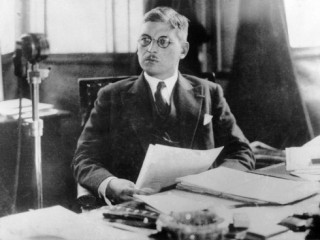
Kurt Von Schuschnigg biography
Date of birth : 1897-12-14
Date of death : 1977-11-18
Birthplace : Riva del Garda, Austria-Hungary (now Italy)
Nationality : Austrian
Category : Politics
Last modified : 2011-09-09
Credited as : statesman, ,
The Austrian statesman Kurt von Schuschnigg served as chancellor of Austria from 1934 to 1938. He succeeded in preventing German absorption of Austria until he lost the support of Mussolini in 1937.
Kurt von Schuschnigg was born on December 14, 1897, at Riva on Lake Garda (now a part of Italy). He was the son of an Austrian army officer. Educated in a Jesuit gymnasium at Feldkirch, Schuschnigg served in the Austro-Hungarian army on the Italian front in World War I. He was decorated for bravery and was a prisoner of war during 1918-1919. In 1922 he received a doctorate in law from the University of Innsbruck.
After practicing law in Innsbruck, Schuschnigg became a candidate of the Christian Socialist party for Parliament and, through the backing of the influential Christian Socialist leader Ignaz Seipel, was elected to Parliament in 1927. In 1932 Schuschnigg was named Austrian minister of justice, and in 1933 he assumed the portfolio of the Ministry of Education in addition to his earlier post. After the assassination of the Christian Socialist chancellor Engelbert Dollfuss during the abortive Nazi putsch of July 25, 1934, Schuschnigg became Austrian chancellor, pledged to defend Austria's independence from Nazi Germany.
Schuschnigg's political views were characteristic of Austrian clerical conservatism. He was a zealous Catholic, staunch antileftist, vehement anti-Nazi, and fervent legitimist. He would have preferred to solve Austria's political problems through the restoration of the Hapsburg dynasty. Schuschnigg had no recourse but to follow Dollfuss's reliance on Italian premier Benito Mussolini's protection against Nazi Germany's desire for Anschluss. The imposition by the League of Nations of sanctions against Italy for its aggression against Ethiopia in 1935 drove Italy into the arms of Germany and rendered Mussolini unable further to defend Austrian independence from German encroachment.
On February 12, 1938, Adolf Hitler summoned Schuschnigg to Berchtesgaden, where he demanded that Schuschnigg order the amnesty of jailed Austrian Nazis and that he include Nazis in his Cabinet, particularly Artur Seyss-Inquart. Schuschnigg agreed to Hitler's demands, but on his return to Vienna he restated his vow to preserve Austria's independence. Hitler then ordered the Austrian Nazis to foment disorder throughout the country. When Schuschnigg ordered a plebiscite to ascertain the country's opinion of his determination to maintain Austria's independence, Hitler demanded the plebiscite's delay and he ordered troops to Austria's border on Schuschnigg's refusal. Schuschnigg then resigned, and he was succeeded by Seyss-Inquart, who called German troops into the country in March 1938.
















